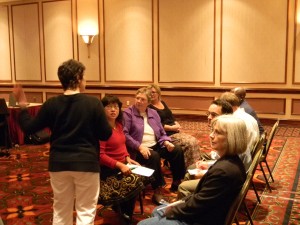Like most natural introverts, I really hate speaking in a group settings. So much so that, for years, I let my reluctance keep me from participating in important conversations, voicing good ideas and asking some important questions. Then I decided that my ideas and contributions were as good as a lot of the stuff I was hearing from others so I started to practice the art of speaking up!
It turns out that simply giving voice to an idea is not enough. People dismiss what you say, talk over the top of you, interrupt you and sometimes just ignore what you’ve said completely. Not fun.
So, I read up on communication skills, took a public speaking class and now…Well I like to think that I’ve learned to be an assertive communicator. I still don’t like it but if I can do it so can you…
Here are a couple of my favorite tips to help you become a more effective communicator—whet her you’re at a town meeting, a committee meeting, or at the family dinner table.
her you’re at a town meeting, a committee meeting, or at the family dinner table.
- Make sure you have the attention of the person you’re speaking to. Eye contact is important. Before you begin, wait a few seconds until everyone is paying attention, then begin.
- Be clear and to the point. Avoid rambling; telling long stories; or getting off track. If you find yourself doing this because you’re nervous then try practicing what you want to say ahead of time. Jot down your major points before you begin.
- Use “I” statements to explain what you want. For example, instead of saying “We should ….” try “I would like us to…” instead.
- Likewise, avoid “you” messages—they can make people angry and defensive. For example, “You make me so mad when you…” or “why are you always late…” are statements that should be re-framed before being said out loud.
- Avoid the ‘set-up’ response…This happens when you begin a statement with an assumption about how your listener will respond. For example, “I know you don’t want to hear this…” or “This is probably going to make you mad…” will program your listener to react negatively to whatever you’re saying. Leaving these set-ups out will greatly improve how others respond to you.
- Stay away from words that are ambiguous, easily dismissed or misunderstood. For example, words like “should”, “could”, “might”, and “maybe” and phrases like “in a few weeks” or “later” or “some other time” leave the listener wide open to interpret what you said in a very different way than what you meant. Don’t be afraid to use strong statements like, “I want”, “I expect”, and “before the next meeting” or “I’d like to set a date now”.
- When tempers get lost—communication goes nowhere. If you’re feeling very angry or frustrated—take a break, leave the conversation. Come back when you’re able to frame what you want to say in a clear and focused way. Losing control will not help you get your message across—it will only frighten and alienate your listeners.
Like most things in life these tips don’t come with guarantees—sometimes communication goes wrong no matter how hard you work at it. And the truth is that some people just don’t want to listen. The strategies I outlined above work for me but you might have other tips that work for you. If so, I hope you’ll share them here. Practice does help –and we all have to work at being better at speaking, and listening, everyday in all of our relations.
Tags: communication, conflict management, groups, meeting management


Do you mind if I quote a couple of your articles as long as I provide credit and sources back to your website? My blog is in the very same area of interest as yours and my visitors would really benefit from some of the information you present here. Please let me know if this alright with you. Thanks!